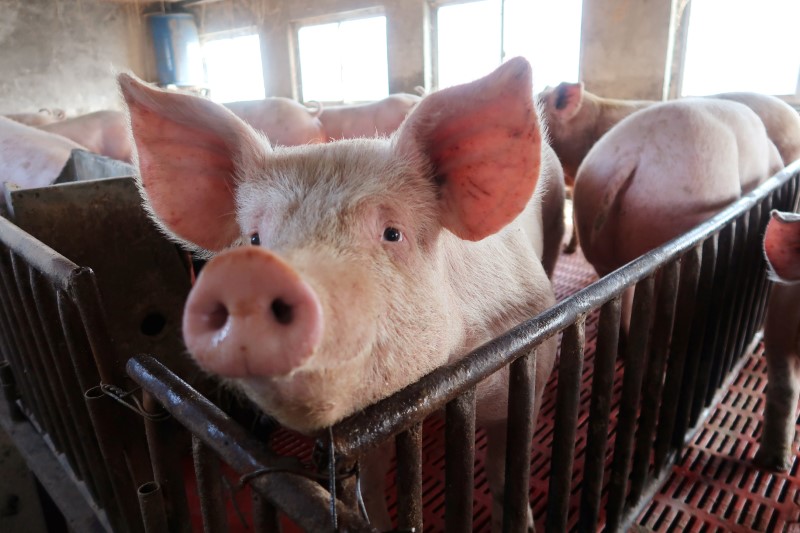By Dominique Patton
BEIJING (Reuters) - Chinese pig prices hit their lowest in nearly four years this week, plunging farmers in the world's top pork market into the red and underscoring concerns that a rapid expansion of large pig farms in China has outpaced slowing demand growth. The sudden downturn - one of the steepest declines over such a short period ever - will mark the first serious test for many companies that have rushed into pig farming in the last two years.
It will also slow imports of pork by the world's top buyer, traders and analysts say. The price is set to recover when demand picks up later in the year but will come under renewed pressure in 2019 as more new farms start production, analysts say.
Live pig prices are now hovering just above 11 yuan (1.26 pounds)per kilogramme in major producing areas such as Henan
"The reason is very clear. There are a lot of pigs on the market," said Feng Yonghui, chief researcher at trade website Soozhu.com.
The sudden plunge in prices is the result of conflicting trends in the industry over the last year. On the one hand, big producers have expanded rapidly to grow market share, but on the other, a government crackdown on pollution that intensified in 2017 shut many small farms, making it difficult to get an accurate picture of supply.
Monthly government data continues to show a drop in the number of breeding pigs, suggesting supply has not yet caught up with demand.
That kept market prices high throughout the winter and led Beijing to release some pork from its reserves. Though volumes released were small, it was another signal of insufficient supply that "misled" the market, said Pan Chenjun, senior analyst at Rabobank.
NEW YEAR'S ABUNDANCE
Abundant supplies became evident in the run-up to mid-February's Lunar New Year festivities, China's peak pork consumption period.
"Slaughterhouses took advantage of the increased supply to set prices, which led to growing price pressure in the market," said Feng.
Prices in February in seven major provinces fell at their fastest pace on Reuters records going back to 2012.
In some regions, farmers are struggling to sell their pigs at prices as low as 10.2 yuan per kg
A small farmer from Daqing city in northeastern Heilongjiang province said she now has pigs weighing 140kg, well over average slaughter weights of 110kg, as they grow fatter on the farm instead of heading to the slaughterhouse.
"Now, two pigs sold at the current price account for the costs I spend on raising one pig," said Ms. Wang. She declined to give her full name.
Large players are losing money too.
Costs at Muyuan Foods Co Ltd (SZ:002714), China's No. 2 pig producer, are around 11.5 yuan per kg, chairman Qin Yinglin said on the sidelines of China's annual parliament meeting.
BETTING ON REBOUND
Plentiful supplies will curb appetite for overseas pork, extending last year's slowdown in purchases. China imported 1.2 million tonnes of pork last year, down 25 percent on the prior year.
"With the large drop in domestic pig prices, the space for imported pork is less and less," said Feng.
For now, most farmers are preparing to ride out the downturn, betting on a rebound in a few months time.
"Losses are temporary. It won't go too far or too long," said Qin.
Muyuan will not change its growth plans, he added. It aims to increase the number of pigs slaughtered to 12 million this year up from last year's 7 million.
Wen Pengcheng, former chairman of top producer Guangdong Wen's Foodstuff Co Ltd (SZ:300498), also shrugged off the impact of low prices, saying the firm's production will rise this year by 15 to 20 percent.
A prolonged downturn could hit some less efficient producers, however, with major repercussions for the global grains sector. China buys 60 percent of the world's soybeans to feed its livestock.

"This year big farms can still make some margins but next year probably everyone will make losses," said Pan at Rabobank.